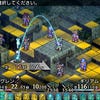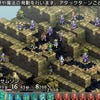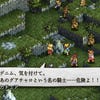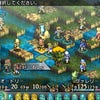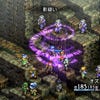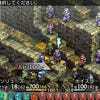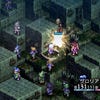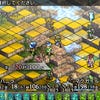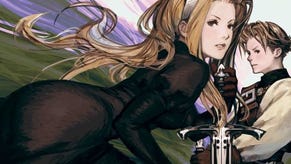Tactics Ogre: Let Us Cling Together
Arm in arms.
In battle, too, there is a huge range of strategic flexibility. Not only can each character be equipped with two weapons, but they can also use and learn magic, granting a huge array of tactical options on the battlefield.
Placement of your troops is another key to success, with terrain height affecting the accuracy and voracity of an attack. Projectile attacks require a clear line of sight to their target and will strike anyone or anything standing in the way, while the direction that you leave units facing will affect their vulnerability to attack from different angles. Meanwhile, weather conditions affect play in the battlefield, with rain and snow impairing visibility for ranged attackers, all factors that must be considered before you pick your team for a fight.
If that all seems like a bit much – and for newcomers, it is a steep learning curve – it's possible to hand control of certain units to the AI with a basic instruction for how you would like them to behave: providing a support role with healing items, for example, or rushing in with melee attacks. There's no limit to the number of units you can hand to the AI, so it's theoretically possible to act as a football manager from the sidelines, directing the general flow of a battle. But with each unit you hand over, you lose a little control.
Flexibility is not limited to the game systems. Tactics Ogre's story branches in a way that few contemporary titles would dare attempt. Battles are bookended by cut-scenes that unravel a grand tale of political intrigue that reaches across continents and generations.
At key points in the drama, you are given an option for how to respond, and your dialogue choices have giant implications. Matsuno and his team elegantly sidestep the problem of branching narratives – the feeling that you're always missing out on something – by allowing you to return to key turning points in the story and choose a different path, encouraging 100 per cent completion in an attainable way.
In battles, too, there is the opportunity to rewind up to 50 moves. If you do, the game stores this rewriting of history as an 'alternate' version of the battle's events, allowing you to switch back and forth between the new set of plays and your original decisions. It's an astounding piece of design that grants flexibility and control across time as well as space.
For devotees of Matsuno's better-known (in the West, at least) Final Fantasy Tactics, the aesthetic, the tone of the story and the music will all be so familiar that Tactics Ogre feels very much like a sequel. But in many ways this earlier title is the superior game, and certainly this PSP remake suffers none of the slowdown and long loading that plagued the PSP version of Final Fantasy Tactics: The War of the Lions.
It is, however a game that demands your full attention. Battles can last upwards of 30 minutes, even with the AI controlling half of your party, and the difficulty demands you absorb and master the intricacies of the system quickly or face crushing defeat. The menu design is fussy and idiosyncratic and the micromanagement of your team, while deep and engaging, means you spend 15 minutes after every fight tinkering.
But the reward for your investment is a thoroughbred classic, a tactical RPG with all the immediacy of Advance Wars and all the long-view flexibility of Disgaea. As with Final Fantasy Tactics, an unusually compelling story ensures you come to view each unit as far more than a pawn and – once you combine the narrative with characters that are built from ten thousand of your own tiny choices – the sense of ownership and connection is rare. Tactics Ogre: Let Us Cling Together matches its tall challenge with deep reward, and provides further testament to the genius of its estranged creator.

